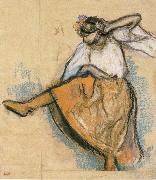Wholesale Oil Painting No Minimum |
|||||||||||
|
|
|||||||||||

|
|||||||||||
|
|
|
||||||||
Edgar DegasFrench Realist/Impressionist Painter and Sculptor, 1834-1917 French painter, draughtsman, printmaker, sculptor, pastellist, photographer and collector. He was a founder-member of the Impressionist group and the leader within it of the Realist tendency. He organized several of the group exhibitions, but after 1886 he showed his works very rarely and largely withdrew from the Parisian art world. As he was sufficiently wealthy, he was not constricted by the need to sell his work, and even his late pieces retain a vigour and a power to shock that is lacking in the contemporary productions of his Impressionist colleagues. |
||||||||
|
|
||||||||
Russian Dancer
Russian Dancer Painting ID:: 50062 |
mk206
1895
Pastel and charcoal on joined tracing paper
laid dow on board
63x54cm
mk206 1895 Pastel and charcoal on joined tracing paper laid dow on board 63x54cm |
|||||||
|
|
||||||||
|
Ernst Ludwig Kirchner German Expressionist Painter and Sculptor, 1880-1938 was a German expressionist painter and printmaker and one of the founders of the artists group Die Brucke or "The Bridge", a key group leading to the foundation of Expressionism in 20th century art. He volunteered for army service in the First World War, but soon suffered a breakdown and was discharged. In 1933, his work was branded as "degenerate" by the Nazis and in 1937 over 600 of his works were sold or destroyed. In 1938 he committed suicide. In 1913, the first public showing of Kirchner's work took place at the Armory Show, which was also the first major display of modern art in America. In 1921, U.S. museums began to acquire his work and did so increasingly thereafter. His first solo show was at the Detroit Institute of Arts in 1937. In 1992, the National Gallery of Art, Washington, held a monographic show, using its existing collection; a major international loan exhibition took place in 2003. In November 2006 at Christie's, Kirchner's Street Scene, Berlin (1913) fetched $38 million, a record for the artist. Russian dancer Date Unknown TTD |
||||||||
|
|
||||||||
|
Prev Next
|
||||||||
|
|
||||||||
|
Related Paintings to Ernst Ludwig Kirchner :. |
||||||||
|
|
||||||||
|
CONTACT US |

